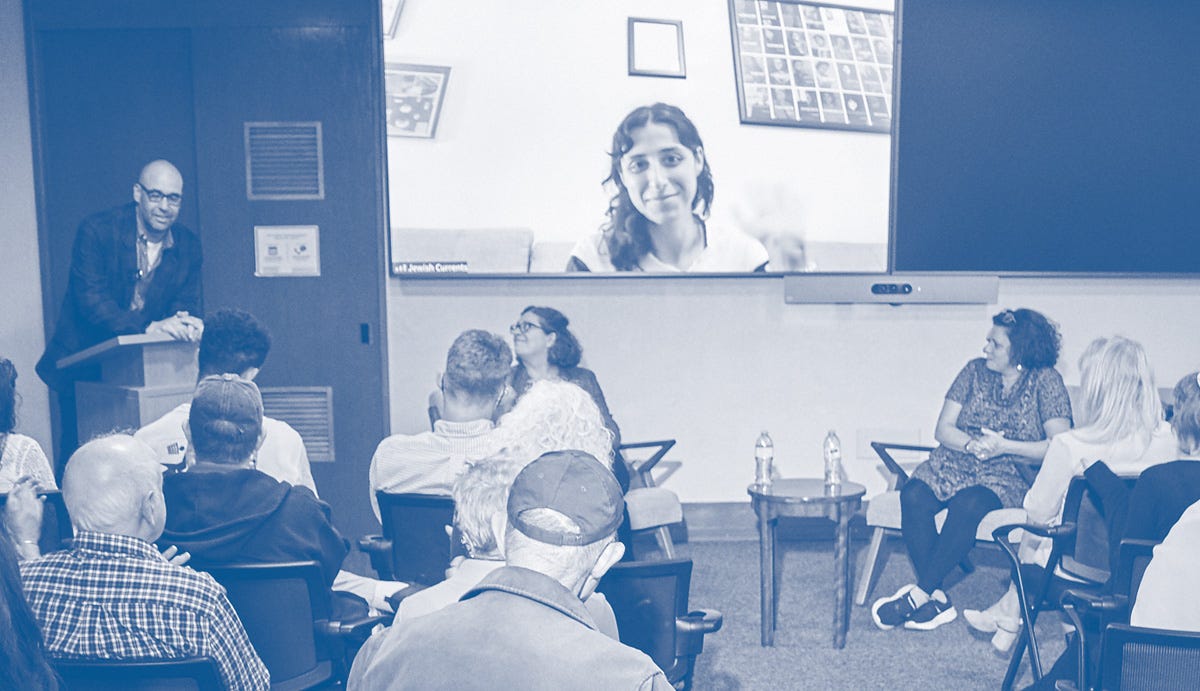Hello and welcome to the October issue of Documensch, the monthly newsletter from the Berman Archive at Stanford. Hamas’ attacks on Israeli citizens and Israel’s response to those attacks have been met with a wide range of responses. As we all struggle to make sense of the new realities born of this moment, we offer our holdings as a resource.
We have an obligation, now especially, to collect and make available the breadth of experiences of American Jewish life. We also believe that we have a responsibility to future generations who will look back to see who we were and what our organizations said and did in this time of crisis and shift.
The Berman Archive has been able to meet the moment by accepting submissions from your email inboxes to help us collect American institutional responses to the Israel-Palestine conflict. We detail ways you can help below. Also this month we share a recap and video of our prescient and potent Jewish Media in America event. We look to the past and our holdings to try to make sense of what’s happening now in the wake of October 7. And finally, since some sentiments can only be properly expressed in Yiddish, we look at a new exhibit coming to the Yiddish Book Center and past pieces of American discourse on the Yiddish language.
As always, reach out with feedback, articles we should consider sharing, or documents we should consider archiving. We can be reached at bermanarchive@stanford.edu.
Thanks for reading,
-Ari
Ari Y Kelman, Director, Berman Archive
History in Your Inbox
We’re hoping you can help us in our effort to document Jewish communal responses to this historical moment.
In response to the recent attacks by Hamas on Israeli civilians, many institutions and organizations have issued statements explaining their perspective. Most of these statements have been circulated on email, which means that they will easily be lost into the inboxes of recipients if they aren’t collected.
We are asking you to send us any emails bearing official statements that you would like to be held as part of the archive of this moment. Please forward any emails you might have in your inbox to: thebermanarchive@gmail.com. We’ll take it from there.
We are most interested in statements from:
- Jewish organizations of all kinds
- Public figures
- Schools, camps or other educational institutions
- Universities
- Synagogues
- Not-for-profit organizations
- Political advocacy groups
We’ve already received hundreds of submissions since putting out the call in mid-October. Please keep them coming. If you’re wondering whether we’re interested, send us what you have, and we can sort them out. For now, our hope is to collect these statements referring to the current crisis and hold them for future reference, reflection, analysis, and observation. We will delete any personal information from emails that will be included in the archive, to preserve your anonymity.
In (Jewish) Media Res

On October 10, the Berman Archive hosted our first event, Jewish Media in America, featuring the leaders of Jewish Currents, the Forward, and J. The Jewish News of Northern California. It was fortuitous, helpful, and heartening to have the opportunity to grapple with the question of how to talk about the war in real time, guided by some of the key shapers of American Jewish discourse.
Of her work at the Forward, Editor-in-Chief Jodi Rudoren said, “We have this great privilege to think about this thing and to try and make sense of it and to help you make sense of it.”
Arielle Angel, Editor-in-Chief of Jewish Currents, addressed the personal and political tensions of the moment when she said, “This crisis has exposed fractures on the Jewish left—our whole newsroom has been affected by this event.” She added, “Our priority is to speak to our audience. There is shared grief and shared commitment to justice, but the way the grief looks and the way justice will play out are very difficult. Because we serve the Jewish left, we’re feeling those convulsions.”
Thank you to everyone who came out to our first event. And thank you to our incredible speakers and guests for taking the time to have a hard and important conversation. If you’d like to see the recording, we’ve posted the video to youtube.
Reflections on an Historic and Horrifying Week
We at the Berman Archive are horrified by the violence of this past month in Israel and Palestine. Where this crisis will lead is still unclear. One way we have addressed this uncertainty is by looking to the past to make sense of the present and, perhaps, to help envision a future of peace, security, justice, and respect.
This fall marked the 50th anniversary of the Yom Kippur War, which was recalled in the wake of the terrorist attacks on Israeli civilians on October 7. This article from the Journal of Jewish Communal Service in 1974 offers reflections on the Yom Kippur War, some of which resonate powerfully today. Writing to his colleagues in Jewish organizations, Arnulf Pins noted, “The Jewish world, and especially the situation for Israel, have changed radically since October 1973. Consequently the reactions of Jews everywhere to the situation and their relationship to Israel will also be different than before the War. As Jewish communal workers we need to review and explore ‘What has really changed?’ and ‘What are the implications of this change for World Jewry and the American Jewish community?’”
In another reflection from 1974 in the Journal of Jewish Communal Service, Charles Zibbell offers a new perspective on the relationship between Israel and the diaspora. Speaking to Jewish leaders in the diaspora, he wrote, “The worst we can do is to sit by uncritically as Israel undergoes the painful process of self examination and change.”
From more recent times with, perhaps, more direct bearing on the current violence, see this briefing report on International Law and fighting in Gaza from Global Law Forum (2008), this Journal of Jewish Communal Service (1979) article about teaching adolescents about grief, and this 1973 transcript of an NBC interview with Rabbi Abraham Joshua Heschel in Response: A Contemporary Jewish Review. Heschel offers some perspective on mourning, violence, and religion during the time of the Vietnam war.
Yiddish Kibitz
Yiddish, the indomitable Jewish language, persists. There are an estimated 250,000 speakers of the language in the US, and the same number in Israel. While the overall numbers of speakers has diminished over the years, interest and passion have remained strong, buoyed in large part by efforts like In Geveb: The Journal of Yiddish Studies, YIVO Institute for Jewish Research, and the work of the Yiddish Book Center in Amherst, Massachusetts.
As Andrew Silow-Carroll notes in his profile of the Yiddish Book Center, Yiddish has been “spoken for over 1,000 years by Ashkenazi Jews in German-speaking lands, Eastern Europe and wherever they migrated.” This month, the Book Center will unveil a new exhibit, “Yiddish: A Global Culture,” telling personal stories through the exploration of “modern Yiddish literature, theater, music, press, and politics through approximately 350 objects.” We’re eager to find our way to the Book Center to get verklempt and fartrakht.
In the meantime, the Berman Archive holds a great deal of American discourse on the Yiddish language.
As Yiddish is having a moment now, it has had many cultural star turns in the past, like the 1980s resurgence observed by Eugene B. Borowitz in a 1986 issue of Sh’ma. Or this assessment of Hebrew and Yiddish in Canada.
We also have not one but TWO histories of secular Yiddish schools.
In a 1914 edition of the Bulletin of the National Conference of Jewish Charities, David de Sola Pool describes a Yiddish-dominated Jewish cultural night in NYC, both critiquing the language’s dominance and understanding it since it’s reflective of the recent mass migration of Eastern European Jews to America. Pool deftly conjured the competing urges of assimilation and cultural preservation at play that evening and in the lives of so many Jews in America.
